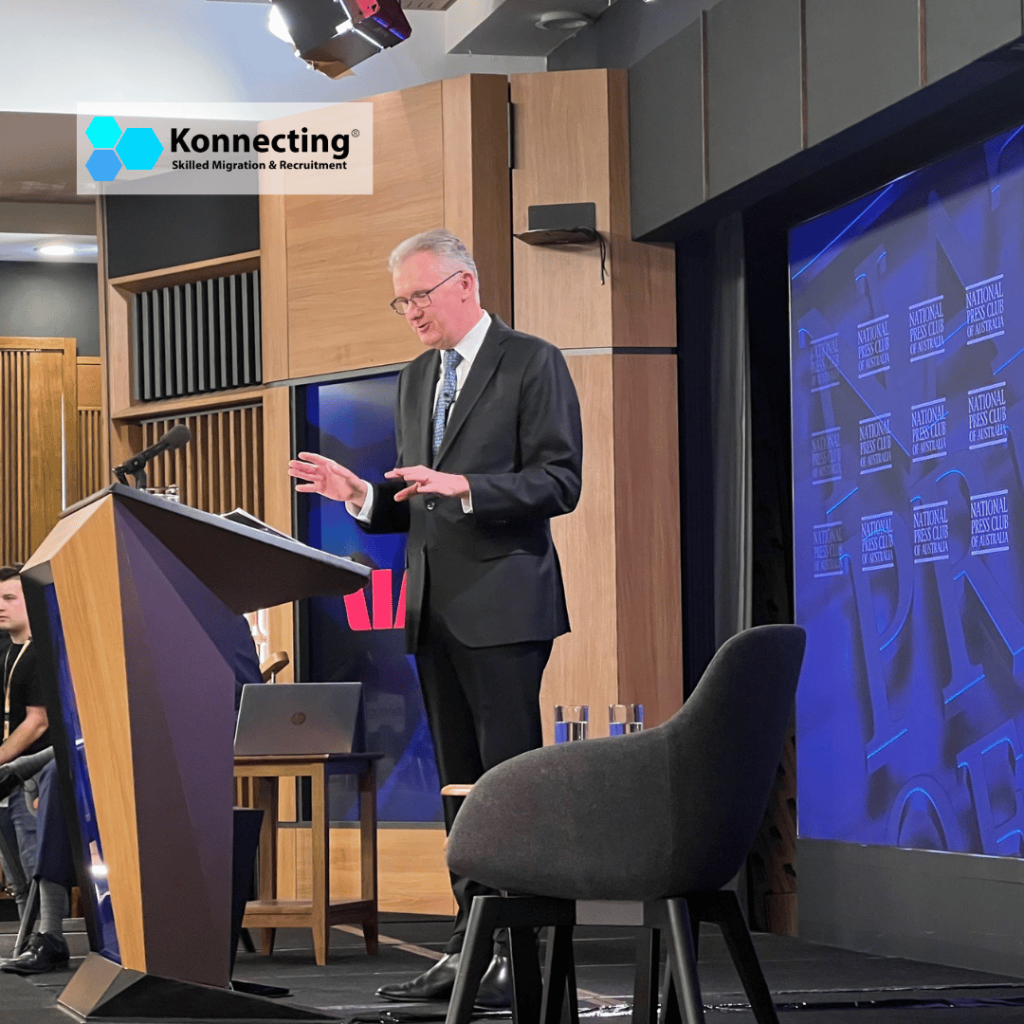Travel Exemptions for Skilled TSS (Subclass 482) Visa Holders
-
Agriculture
-
All Agriculture
Select sub classifications-
Agricultural Technician
-
Fisheries Officer
-
Meat Inspector
-
Quarantine Officer
-
Primary Products Inspector Nec
-
Aquaculture Farmer
-
Cotton Grower
-
Flower Grower
-
Fruit or Nut Grower
-
Grain, Oilseed or Pasture Grower
-
Grape Grower
-
Mixed Crop Farmer
-
Sugar Cane Grower
-
Turf Grower
-
Vegetable Grower
-
Crop Farmers nec
-
Apiarist
-
Beef Cattle Farmer
-
Dairy Cattle Farmer
-
Deer Farmer
-
Goat Farmer
-
Horse Breeder
-
Mixed Livestock Farmer
-
Pig Farmer
-
Poultry Farmer
-
Sheep Farmer
-
Livestock Farmer nec
-
Mixed Crop and Livestock Farmer
-
Hunter Trapper
-
Pest Controller
-
Farm, Forestry and Garden Workers Nec
-
Wine Maker
-
Food Technologist
-
Agricultural Engineer
-
Agriculture Consultant
-
Forester
-
Biomedical Engineer
-
Production Manager (Forestry)
-
Shearer
-
Veterinary Nurse
-
Wool Buyer
-
Florist
-
Gardener (General)
-
Arborist
-
Landscape Gardener
-
Greenkeeper
-
Nurseryperson
-
Dog Trainer or Handler
-
Horse Trainer
-
Pet Groomer
-
Zookeeper
-
Animal Attendants and Trainers (nec)
-
Agricultural and Horticultural Mobile Plant Operator
-
Logging Plant Operator
-
Conservation Officer
-
Environmental Consultant
-
Environmental Research Scientist
-
Park Ranger
-
Environmental Scientists (nec)
-
Automotive Heavy Mechanic (Agricultural)
-
-
Automotive
-
All Automotive
Select sub classifications-
Automotive Electrician
-
Motor Vehicle Parts and Accessories Fitter
-
Motor Vehicle or Caravan Salesperson
-
Panelbeater
-
Motor Vehicle Parts Interpreter
-
Vehicle Body Builder
-
Vehicle Trimmer
-
Vehicle Painter
-
Motor Mechanic (General)
-
Diesel Motor Mechanic
-
Motorcycle Mechanic
-
Small Engine Mechanic
-
Workshop/Service Centre Manager
-
Workshop Manager/Leading Hand
-
Fleet Manager
-
Railway Station Manager
-
Transport Company Manager
-
Others
-
-
Engineering
-
All Engineering
Select sub classifications-
Engineering Manager
-
Chemical Engineer
-
Materials Engineer
-
Civil Engineer
-
Geotechnical Engineer
-
Quantity Surveyor
-
Structural Engineer
-
Transport Engineer
-
Electrical Engineer
-
Electronics Engineer
-
Industrial Engineer
-
Mechanical Engineer
-
Production or Plant Engineer
-
Mining Engineer (excluding Petroleum)
-
Petroleum engineer
-
Aeronautical Engineer
-
Agricultural Engineer
-
Biomedical Engineer
-
Engineering Technologist
-
Environmental Engineer
-
Naval Architect
-
Engineering Professionals (nec)
-
Telecommunications Engineer
-
Telecommunications Network Engineer
-
Civil Engineering Technician
-
Civil Engineering Draftsperson
-
Electrical Engineering Technician
-
Electrical Engineering Draftsperson
-
Electronic Engineering Technician
-
Electronic Engineering Draftsperson
-
Mechanical Engineering Technician
-
Mechanical Engineering Draftsperson
-
Telecommunications Field Engineer
-
Telecommunications Network Planner
-
Telecommunications Technical Officer or Technologist
-
Architectural Draftsperson
-
Building Associate
-
Building Inspector
-
Construction Estimator
-
Plumbing Inspector
-
Surveying or Spatial Science Technician
-
Architectural, Building & Surveying Technicians (nec)
-
Safety Inspector
-
Maintenance Planner
-
Metallurgical or Materials Technician
-
Mine Deputy
-
Building and Engineering Technicians nec
-
Aeroplane Pilot
-
Air Traffic Controller
-
Flying Instructor
-
Helicopter Pilot
-
Air Transport Professionals nec
-
Master Fisher
-
Ship's Engineer
-
Ship's Master
-
Ship's Officer
-
Ship's Surveyor
-
Marine Transport Professionals nec
-
Architect
-
Landscape Architect
-
Surveyor
-
Cartographer
-
Other Spatial Scientist
-
Industrial Designer
-
Urban and Regional Planner
-
Software Engineer
-
Computer Network & Systems Engineer
-
ICT Quality Assurance Engineer
-
ICT Support Engineer
-
ICT Systems Test Engineer
-
ICT Support and Test Engineers (nec)
-
Aircraft Maintenance Engineer (Avionics)
-
Aircraft Maintenance Engineer (Mechanical)
-
Aircraft Maintenance Engineer (Structures)
-
Others
-
-
Healthcare & Medical
-
All Healthcare & Medical
Select sub classifications-
Registered Nurse (Aged Care)
-
Registered Nurse (Child & Family Health)
-
Registered Nurse (Community Health)
-
Registered Nurse (Critical Care & Emergency)
-
Registered Nurse (Developmental Disability)
-
Registered Nurse (Disability & Rehabilitation)
-
Registered Nurse (Medical)
-
Registered Nurse (Medical Practice)
-
Registered Nurse (Mental Health)
-
Registered Nurse (Perioperative)
-
Registered Nurse (Surgical)
-
Registered Nurse (Paediatrics)
-
Registered Nurses (nec)
-
MIDWIFE
-
Nurse Practitioner
-
General Practitioner
-
Resident Medical Officer
-
Anaesthetist
-
Specialist Physician (General Medicine)
-
Cardiologist
-
Clinical Haematologist
-
Medical Oncologist
-
Endocrinologist
-
Gastroenterologist
-
Intensive Care Specialist
-
Neurologist
-
Paediatrician
-
Renal Medicine Specialist
-
Rheumatologist
-
Thoracic Medicine Specialist
-
Specialist Physicians nec
-
Psychiatrist
-
Surgeon (General)
-
Cardiothoracic Surgeon
-
Neurosurgeon
-
Orthopaedic Surgeon
-
Otorhinolaryngologist
-
Paediatric Surgeon
-
Plastic and Reconstructive Surgeon
-
Urologist
-
Vascular Surgeon
-
Dermatologist
-
Emergency Medicine Specialist
-
Obstetrician and Gynaecologist
-
Ophthalmologist
-
Pathologist
-
Diagnostic and Interventional Radiologist
-
Radiation Oncologist
-
Medical Practitioners nec
-
Medical Diagnostic Radiographer
-
Medical Radiation Therapist
-
Nuclear Medicine Technologist
-
Sonographer
-
Optometrist
-
ORTHOPTIST
-
Dietitians
-
Environmental Health Officer
-
Occupational Health and Safety Adviser
-
Hospital Pharmacist
-
Industrial Pharmacist
-
Retail Pharmacist
-
Health Promotion Officer
-
Orthotist or Prosthetist
-
Health Diagnostic and Promotion Professionals nec
-
Chiropractors
-
Osteopaths
-
Acupuncturist
-
Homeopath
-
Naturopath
-
Traditional Chinese Medicine Practitioner
-
Complementary Health Therapist nec
-
Dental Specialist
-
Dentist
-
Occupational Therapist
-
Physiotherapist
-
Podiatrist
-
Audiologist
-
Speech Pathologist
-
Nurse Educator
-
Nurse Researcher
-
Nurse Manager
-
Medical Administrator
-
Nursing Clinical Director
-
Primary Health Organisation Manager
-
Welfare Centre Manager
-
Health And Welfare Services Managers (nec)
-
Enrolled Nurse
-
Mothercraft Nurse
-
Ambulance Officer
-
Intensive Care Ambulance Paramedic
-
Dental Hygienist
-
Dental Prosthetist
-
Dental Technician
-
Dental Therapist
-
Diversional Therapist
-
Aboriginal and Torres Strait Island Health Worker
-
Massage Therapist
-
Community Worker
-
Disabilities Services Officer
-
Family Support Worker
-
Parole or Probation Officer
-
Residential Care Officer
-
Youth Worker
-
Anaesthetic Technician
-
Cardiac Technician
-
Medical Laboratory Technician
-
Operating Theatre Technician
-
PHARMACY TECHNICIAN
-
Pathology Collector
-
Medical Technicians (nec)
-
Other
-
-
IT
-
All IT
Select sub classifications-
Chief Information Officer
-
ICT Project Manager***
-
ICT Managers (nec)
-
ICT Trainer
-
ICT Business Analyst
-
Systems Analyst
-
Multimedia Specialist
-
Web Developer***
-
Analyst Programmer
-
Developer / Programmer
-
Software Engineer
-
Software Tester
-
Software & Applications Programmers (nec)
-
Database Administrator
-
ICT Security Specialist
-
Systems Administrator
-
Computer Network & Systems Engineer
-
Network Administrator
-
Network Analyst
-
ICT Quality Assurance Engineer
-
ICT Support Engineer
-
ICT Systems Test Engineer
-
ICT Support and Test Engineers (nec)
-
Web Administrator
-
ICT Account Manager
-
ICT Business Development Manager
-
ICT Sales Representative
-
Multimedia Designer
-
Graphic Designer
-
Illustrator
-
Web Designer
-
Other
-
-
Scientific
-
All Scientific
Select sub classifications-
Conservation Officer
-
Environmental Consultant
-
Environmental Research Scientist
-
Park Ranger
-
Environmental Scientists (nec)
-
Anatomist or Physiologist
-
Biochemist
-
Biotechnologist
-
Botanist
-
Marine Biologist
-
Microbiologist
-
Zoologist
-
Life scientists (nec)
-
Life scientist (General)
-
Chemistry Technician
-
Earth Science Technician
-
Life Science Technician
-
School Laboratory Technician
-
Science Technicians (nec)
-
Medical Laboratory Scientist
-
Chemist
-
Food Technologist
-
Wine Maker
-
Geologist
-
Geophysicist
-
Agriculture Scientist
-
Chemical Engineer
-
Laboratory Manager
-
Natural and Physical Science Professionals nec
-
Nutritionist
-
Pathology Collector
-
Quality Assurance Manager
-
Sales Representative - Medical and Pharmaceutical
-
Veterinarian
-
Others
-
Hospital Pharmacist
-
Industrial Pharmacist
-
Retail Pharmacist
-
-
Trade
-
All Trade
Select sub classifications-
Airconditioning and Mechanical Services Plumber
-
Airconditioning and Refrigeration Mechanic
-
Aircraft Maintenance Engineer (Avionics)
-
Aircraft Maintenance Engineer (Mechanical)
-
Aircraft Maintenance Engineer (Structures)
-
Apparel Cutter
-
Baker
-
Pastrycook
-
Blacksmith
-
Boat Builder and Repairer
-
Bricklayer
-
Broadcast Transmitter Operator
-
Business Machine Mechanic
-
Butchers and Smallgoods Maker
-
Cabinetmaker
-
Cabler (Data and Telecommunications)
-
Camera Operator (Film, Television or Video)
-
Canvas Goods Fabricator
-
Carpenter
-
Carpenter and Joiner
-
Chef
-
Chemical Plant Operator
-
Clothing Trades Worker (nec)
-
Clothing Patternmaker
-
Communications Operator
-
Cook
-
Drainer
-
Dressmaker or Tailor
-
Electrical Linesworker
-
Electrician (General)
-
Electrician (Special Class)
-
Electronic Equipment Trades Worker
-
Electronic Instrument Trades Worker (General)
-
Electronic Instrument Trades Worker (Special Class)
-
Electroplater
-
Engineering Patternmaker
-
Engraver
-
Farrier
-
Fibrous Plasterer
-
Fire Protection Equipment Technician
-
Fitter (General)
-
Fitter and Turner
-
Fitter-Welder
-
Floor Finisher
-
Furniture Finisher
-
Gallery or Museum Technician
-
Gas or Petroleum Operator
-
Gasfitter
-
Glazier
-
Graphic Pre-press Trades Worker
-
Gunsmith
-
Hairdresser
-
Jeweller
-
Joiner
-
Leather Goods Maker
-
Lift Mechanic
-
Light Technician
-
Locksmith
-
Make up Artist
-
Metal Casting Trades Worker
-
Metal Fabricator
-
Metal Fitters and Machinists nec
-
Metal Machinist (First Class)
-
Metal Polisher
-
Musical Instrument Maker or Repairer
-
Optical Dispenser
-
Optical Mechanic
-
Painting Trades Workers
-
Pastry cook
-
Performing Arts Technician (nec)
-
Picture Framer
-
Plastics Technician
-
Plumber (General)
-
Power Generation Plant Operator
-
Precision Instrument Maker and Repairer
-
Pressure Welder
-
Print Finisher
-
Printing Machinist
-
Roof Plumber
-
Roof Tiler
-
Sail Maker
-
Saw Maker and Repairer
-
Screen Printer
-
Sheetmetal Trades Worker
-
Shipwright
-
Shoemaker
-
Signwriter
-
Small Offset Printer
-
Solid Plasterer
-
Sound Technician
-
Stonemason
-
Technical Cable Jointer
-
Technicians and Trades Workers nec
-
Telecommunications Cable Jointer
-
Telecommunications Linesworker
-
Telecommunications Technician
-
Television Equipment Operator
-
Textile, Clothing and Footwear Mechanic
-
Toolmaker
-
Upholsterer
-
Wall and Floor Tiler
-
Watch and Clock Maker and Repairer
-
Welder (First Class)
-
Wood Machinist
-
Wood Machinists and Other Wood Trades Workers nec
-
Wood Turner
-
Fashion Designer
-
Jewellery Designer
-
Interior Designer
-
Other
-
REFINE RESULTS
Travel Exemptions for Skilled TSS (Subclass 482) Visa Holders
Overview of travel exemptions
Australia has strict border measures in place to protect the health of the Australian community. Under exempt category, you have been granted an individual exemption to the current travel restrictions.
If you are not in an exempt category, you can request travel exemption to the Australian Border Force (ABF). The majority of travel exemption requests to come to Australia are finalised within 7 days, but some complex requests may take longer.
Who doesn’t need exemptions (Exempt Categories)
You are automatically exempt from the travel restrictions and can enter Australia (without obtaining an individual exemption) if you are:
- an Australian citizen
- a permanent resident of Australia
- an immediate family member of an Australian citizen or permanent resident*
- a New Zealand citizen usually resident in Australia and their immediate family members
- a diplomat accredited to Australia (holding a subclass 995 visa)
- a traveller transiting Australia for 72 hours or less
- airline crew
- a maritime crew including marine pilots
- recruited under the Government approved Seasonal Worker Program or Pacific Labour Scheme
- holder of a Business Innovation and Investment (subclass 188) visa
- travelling from New Zealand by air and have been in New Zealand 14 days before travel
Note: Relevant Federal/State quarantine requirements are still in place, so check before arrival. Refer below.
Travel exemptions are possible for certain critical industries and roles
Travel exemptions may be granted to the Temporary Skill Shortage (Subclass 482) visa or other visa holders/applicants if they are:
- travelling at the invitation of the Australian Government or a state or territory government authority to assist in the COVID-19 response
- providing critical or specialist medical services, including air ambulance, medical evacuations and delivering critical medical supplies
- with critical skills required to maintain the supply of essential goods and services (such as in medical technology, critical infrastructure, telecommunications, engineering and mining, supply chain logistics, aged care, agriculture, primary industry, food production, and the maritime industry)
- delivering services in sectors critical to Australia’s economic recovery (such as financial technology, large scale manufacturing, film, media and television production and emerging technology), where no Australian worker is available
- providing critical skills in religiious or theology fields
- sponsored by your employer to work in Australia in an occupation on the Priority Migration Skilled Occupation List (PMSOL)
- whose entry would otherwise be in Australia’s national interest, supported by the Australian Government or a state or territory government authority.
The exemption also for 494
Travel exemptions are required for TSS subclass 482 visa holders and Skilled Employer-Sponsored Regional (SESR Subclass 494) visa holders.
How and when to apply (pre visa lodgement, or post visa lodgement etc)
An exemption should generally be applied for at least two weeks, but not more than three months, before planned travel. Urgent business travel will be considered inside this timeframe.
An individual making a request does not need to hold a visa at the time of applying for an exemption from Australia’s travel restrictions. If the travel exemption is approved you need to have a valid visa to travel. All requirements must be met to be granted a visa.
Mandatory hotel quarantine
To prevent the spread of COVID-19, travellers arriving in Australia by air or sea may need to go into government-approved mandatory quarantine for 14 days from arrival. Exceptions include travellers who are:
- travelling from a green safe travel zone, or
- in an exemption category.
State and territory governments, with support from the Australian Government, manage quarantine arrangements including:
- transport for travellers from their arrival point to their quarantine accommodation
- quarantine arrangements at the accommodation facility
You must quarantine in the city you arrive in for 14 days, even if you plan to travel elsewhere in Australia.
Once you have completed quarantine, you can travel within Australia in line with state and territory domestic travel restrictions. This may include further quarantine requirements.
You may be tested for COVID-19 in the first 48 hours and then between days 10 to 12 of quarantine. If you refuse to test, you may have to quarantine for a longer period. Exact testing arrangements depend on states and territories.
In some states and territories, you may also have to contribute to the cost of quarantine.
To learn more or to ask about someone you know who is quarantined, contact your state or territory government health department.
Updates:
The Australian Government are constantly updating travel exemptions in line with health advice.
More details on travel restrictions here
Examples of some successful travel exemption requests:
- Welder/Fabricator sponsored by/working for an employer with projects in Sydney’s Infrastructure Projects
- Diesel technician/mechanic sponsored by/working for an employer in mining support businesses in Western Australia
- Bio-medical engineer sponsored by/working for an employer in Covid-related pharmaceutical business
- Registered Nurses on the front line
Occupations on the Priority Migration Skilled Occupation List (PMSOL)
Including the 17 occupations (ANZSCO code) which are given priority in visa process and travel exemption request.
- Chief Executive or Managing Director (111111)
- Construction Project Manager (133111)
- Mechanical Engineer (233512)
- General Practitioner (253111)
- Resident Medical Officer (253112)
- Psychiatrist (253411)
- Medical Practitioner nec (253999)
- Midwife (254111)
- Registered Nurse (Aged Care) (254412)
- Registered Nurse (Critical Care and Emergency) (254415)
- Registered Nurse (Medical) (254418)
- Registered Nurse (Mental Health) (254422)
- Registered Nurse (Perioperative) (254423)
- Registered Nurses nec (254499)
- Developer Programmer (261312)
- Software Engineer (261313)
- Maintenance Planner (312911)
More Information:
Feel free to contact our Registered Migration Agents for more information.
Related News
National Press Club – Address by the Hon Tony Burke MP
National Press Club – Address by the Hon Tony Burke MP Canberra, ACT, Oct 15, 2025 Attended by Fred Molloy, Registered Migration Agent. On Wed 15th October I attended the Honorable Minister Tony Burkes speech at the National Press Club in Canberra. The Minister has vast portfolio of Home Affairs, The Arts, Cyber…
Shaping the Future of Australia’s Workforce with Jobs and Skills Australia
Shaping the Future of Australia’s Workforce with Jobs and Skills Australia Australia is at a pivotal moment where the need for a skilled and adaptable workforce is more crucial than ever. Jobs and Skills Australia, an influential body in workforce development, recognises that collaboration with stakeholders is essential to effectively address the country’s present and…
Economic Outlook for the 24/25 Financial Year
Australia’s economic trajectory for the 2024–25 financial year signals a cautious yet steady recovery. Real GDP growth is forecast to rise to 1.5%, improving from 1.4% in 2023–24, and is projected to reach 2.25% in 2025–26. This recovery will be driven primarily by a rebound in household consumption, boosted by government cost-of-living tax cuts and…





